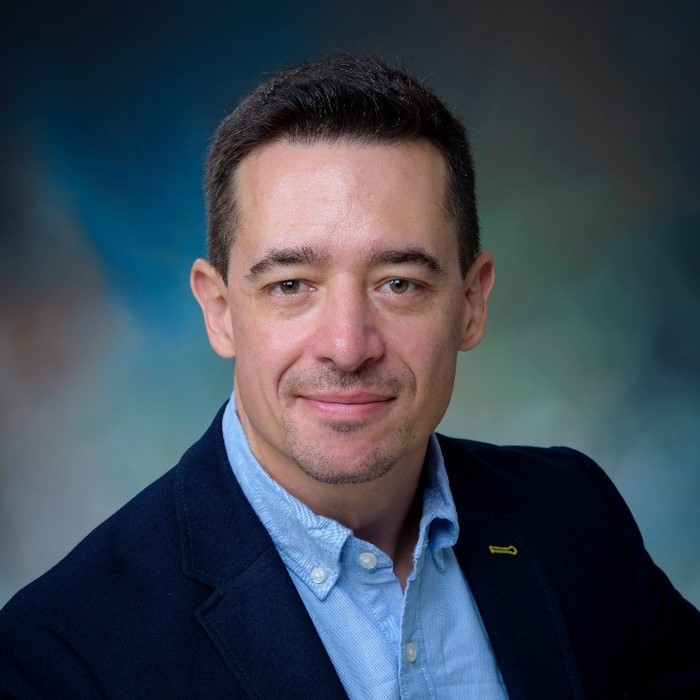Professor Alberto Aparicio
Alberto Aparicio, Ph.D. is Assistant Professor in the Department of Bioethics and Health Humanities at The University of Texas Medical Branch.
Alberto has held various policy and management roles, in academic, consultancy, and government institutions. His research interests include the governance of emerging biotechnology, societal responses to shifting meanings and attitudes about life in contemporary bioscience, and the framing and social relevance of technoscience.
Since 2019, Alberto has been an Honorary Research Fellow in the Department of Science and Technology Studies at UC, and since 2023, Assistant Professor of Bioethics and Health Humanities.
His first postdoctoral fellowship was at the Alexander von Humboldt Biological Resources Research Institute in Colombia between 2020 and 2021, focused on the project Social Study of the Valuation of Biodiversity and its Relationship with Narratives, Imaginaries, and Bioeconomy Strategies in Biodiversity Study Initiatives in Colombia. This project analyzes the creation, capture, and circulation of ‘value’ in the relationship between the study of biodiversity and its contribution to the bioeconomy in Colombia. Read The road ahead: narratives and imaginaries of the value of biodiversity in shaping bioeconomy policy in Colombia.
He completed his second postdoctoral fellowship between 2021 and 2023 for the Global Observatory for Genome Editing at the Program on Science, Technology & Society at the Harvard Kennedy School of Government, seeking to expand the range of questions and actors about the novel possibility of genome editing in humans.
Alberto earned his Ph.D. in Science and Technology Studies from University College London in 2019. His thesis was titled Accept No Limits: Imaginaries of Life, Responsibility and Biosafety in Xenobiology.
In his doctoral research, Alberto tried to better understand scientific practice in xenobiology through engagement with synthetic biologists. In particular, he is interested in how the problems and promises of xenobiology are constructed, such as the engineering of organisms with built-in biological containment features.
He earned his MPhil in Technology Policy from Cambridge University in 2013. He addressed the central question about how to accelerate innovation processes supported mainly by government actors. He looked into Public Science and Technology Policy, Strategy, Innovation Management, Entrepreneurship, Negotiation, Complex Systems, and Political Economy.
He earned his Master’s Degree of Science in Biochemistry from the University of Saskatchewan, Saskatoon, Canada in 2009. In his thesis research, he discovered compounds with anti-cancer potential. Working in the laboratory further awakened his concerns about what the contribution and relationship between science and society should be, and how to govern technological development so that it aligns with the needs of society.
Alberto earned his Bachelor’s Degree of Science in Microbiology from the Universidad de Los Andes, Bogotá, Colombia in 2006 with his dissertation Culture of Frog skin derived micro-organs and Biochemical Analysis of Conditioned Medium. The project was oriented towards the discovery of anti-cancer molecules.
After his Master’s in 2009, Alberto became Professor of Food Science, Food Safety, and Microbiology at the Institute Superior Mariano Moreno in Colombia. In the same year, he continued as the Associate Data Coordinator at Merck, working in the Global Pharmacovigilance Center in Colombia. As a coordinator, he prepared reports on adverse events that occurred with MSD medications that were subsequently entered into databases of regulatory agencies.
In 2011, he redirected his career towards knowledge management and innovation as Innovation Consultant at Inventta. Alberto evaluated the potential for commercializing technologies developed in universities and their value to establish ventures (spin-offs), as well as the design of business plans and identification of opportunities. He decided to study for a Master’s Degree in Innovation and Policy to consolidate his knowledge of the sector.
After his Master’s, Alberto became Strategic advisor for the International Cooperation Office at Servicio Nacional de Aprendizaje (SENA).
From SENA he continued to a Ph.D. in Science, Technology, and Society to deepen his understanding of knowledge management and science and technology policy.
During his time at UCL, Alberto was also Postgraduate Teaching Assistant there for the undergraduate courses Governing Emerging Technologies and Science Policy.
In 2017, he was a Visiting Fellow in the Program on Science, Technology, and Society at Harvard University, and between 2018 and 2019, Alberto was Project Coordinator and Vice-Rector for Investigación y Creación at the Universidad de Los Andes.
Alberto is a Member of the Institute for Bioethics and Health Humanities, Society for Social Studies of Science, Science and Democracy Network, and Global Observatory for Genome Editing.
Read Accept no Limits: biocontainment and the Construction of a Safer Space for Experimentation in Xenobiology as a Legacy of Asilomar and Missing the “We” in Precision Medicine.
Visit his LinkedIn profile, his Academic page, and Google Scholar page. Follow him on Facebook, Instagram, and X.
